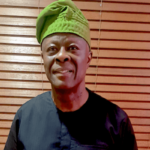.jpg)
What motivated the setting up of the centre?
Before I graduated from OAU Ile Ife in 1992, I noticed great disparity between what I understand to be the standard of care and what was actually obtained in the hospitals and I was determined to tow the path that my predecessors were setting for me. I was fortunate to be trained by amazing nurses that got me inspired to be a true Florence Nightingale nurse. I am aware that no matter how bad things were, you will be there for your patients.
That was when I formed the philosophy that if I am taking care of an elderly man, I assume he is my father. And I pray that when my father is ill in Port Harcourt God will send him an amazing nurse who will take care of him as I am taking care of this man. So for me it was very personal and very rewarding. Yet my heart continues to break from the norm.
Considering your HIV/AIDS advocacy, would you see it as a mirror of Nigeria’s healthcare?
During the early days of HIV epidemic, there were so much unethical practices; the facts that care were not driven by respect for the patients’ rights. Their lives of patients were a living hell; they were abandoned and ridiculed and denied care. The violation of their right to confidentiality could mean that while they are sitting in their place of work and their employer has their HIV test result and they are getting termination letters.
As a health professional you are not doing this people a favour, it is their right to receive decent, respectful care. And it is your responsibility, when you took the oath and got the job, to provide that care. So that was what motivated me to start Centre for the Right to Health (CRH). My believe is that if we get health professionals to respect the rights of people living with HIV, they will extend and accord these rights to other patients. So HIV became for us a steering rod through which to get to all the other issues that deals with our health care system and social support services.
We started providing care and support for people living with HIV AIDS. We are doing a lot of education and training, documenting human rights violations, doing advocacy and building the capacity of health care professionals, lawyers and judges in issues of justice, looking at their role in affirming human rights.
That has been the journey overtime and the challenges. We actually took the Lagos State Government to court over a patient that they denied care. And it is also difficult for persons living with HIV because even when you want to institute litigation, it means also they face further harm, the exposure, stigma and discrimination. So in view of that, we were able to file a case against the Lagos State Hospital Management and Miss X. So we filed to use the pseudonym. And that application was granted even though the judgment was not eventually in our favour and it was about the time our legal officer kind of moved on to study for his PhD, and the volunteers that were working with us were not organised so we missed the time line for us to appeal the case. At least this was what we were able to do in terms of access and the right to healthcare.
Tell us more about your life and the struggle to improve access and right to health in Nigeria
After I graduated from the School of Nursing of the Obafemi Awolowo University, Ile Ife, we have been building the capacity of HIV/AIDS patients to be their own self advocates and an integrated programme to one another. It was on the strength of my work that I won the Oprah Winfrey scholarship to study for a Masters Degree at the Wagner School of Public Service in the New York University. I also got another fellowship to the Southern Illinois University for my PhD. My dissertation was on women living with HIV/AIDS and how they are coping with stigma and the challenges.
So I came home to collect data for the research in September 2007 and was involved in a road accident on the Zaria highway on my way to attend a board meeting in Kano. When I regained consciousness, they were trying to pull me out from crashed vehicle and I was in severe pains.
When we finally did the MRI, our worst fear was confirmed, I have fractured my bones at the level of T4 and T5 and my spinal cord has been crushed. We didn’t have a neuro-surgeon to review the MRI, and we started running around to find a neurosurgeon. Then we found one from Usman Dan Fodio University, Sokoto. He came very late in the night and there wasn’t even a laptop to read the MRI and we have to come from my office to get the laptop to read the MRI.
He eventually read the MRI, took the picture of it on the cell phone and came to me and said: ‘Stella, 15 per cent compression is critical and you have over 45 per cent compression. We will do conservative management.’ And I was like why would you do conservative management for a critical situation whatever happened to aggressive diagnostic management?
He responded, ‘Stella we know what to do but we don’t have the equipment to do it.’ And all the medical persons and activists were out for me. I was flown to Ghana were medical officials were already waiting for the surgery.
I told God that if He is the one that gave me this assignment, He didn’t intend I do it from the wheelchair, paralysed. I knew the Lord was not done with me yet. So my faith was never shaken.
How do we realize adequate healthcare funding during economic downturn when there are other competing demands?
There is a National Health Act. They said they will take 1 percent from the consolidated revenue for the health sector, but they didn’t capture it in the current budget. Already Nigerian government has contravened its own law. As Citizens how they are going to make it happen is not our business. All the monies they have been recovering from God knows where what are they doing with it? All the resources what are they doing with them? Can we make our hospitals cleaner? We have so many over bloated hospitals. Can we ensure that things that are brought to be used there are actually used there? It is not just about the budget, we also need to do oversight.
Then the National Health Insurance Scheme is another resource. Even in the United States it is quite a struggle. All of us are paying out of pocket for many of the care. There should be a minimum package of health that we should all get. It can be funded not just from the budget. If we all contribute to a pool the money we have been spending out of pocket, not everybody is going to fall sick at the same time. If the pool is judiciously used especially, through public-private enterprise, we can take care of many of these health concerns.
Beyond the issue of resource, when we come to the issue of the right of patients, right now, it is not only those that are looking for free healthcare that their rights are being abused. Even when you are paying through your nose in some of the private hospitals, people are not following the ethical standards. There are mistakes, carelessness and callousness. Yet it is the patient and his or her relatives that bear the consequences, there is absolutely no consequences for the health care professional or the institution. So if we use redress mechanisms, such as ‘know your right.’ how many people know about the Health Act? Do you have a right to information? What about right to privacy? Does your right to be treated with dignity cost money too? Does empathy and compassion cost money too? Woman goes to labour and she is beaten and denied her dignity does it cost money to show humanity?
Is it training or lack of compassion that drives this kind of attitude from health professionals?
Each person need to ask himself where is our humanity When you get in there you become cynical; death don’t matter anymore and there is no consequence. In the US, before you practice you have to get malpractice insurance because if you don’t do it right, you will be sued and you will pay. I thought the patient is the customer. We could take advantage of the administrative mechanisms if the CMD is getting reports and petitions about the little things that are happening, do you keep hiring them? Here we say let’s leave it to God.
What trajectory can you draw for a change?
We could start by educating the patients, the community everybody including the health workers themselves. I was a health worker. But when you fall into the patient mode, you become lower than the doctor. So we need to change that mode and begin. If health workers see themselves as potential patients, there will be passion for service. We need to take this as collective responsibility. When the nurses don’t put oxygen into the oxygen tank, the patient is going to die. We need activism also. Health is within.
 Join Daily Trust WhatsApp Community For Quick Access To News and Happenings Around You.
Join Daily Trust WhatsApp Community For Quick Access To News and Happenings Around You.


